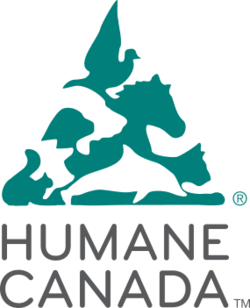Humane Canada facts for kids
 |
|
| Founded | 1957 |
|---|---|
| Type | Non-profit |
| Purpose | Animal welfare |
| Headquarters | Ottawa, Ontario |
| Location |
|
|
Official language
|
English French |
|
Key people
|
Barbara Cartwright (CEO) |
|
Budget
|
$535,000 (2013) |
|
Staff
|
5 |
|
Formerly called
|
Canadian Federation of Humane Societies |
Humane Canada, also known as the Canadian Federation of Humane Societies (CFHS), is a special group in Canada. It is a non-profit organization that works to help animals. They represent many animal shelters and rescue groups across the country. Their main goal is to make sure animals are treated kindly and to stop animal cruelty.
Contents
How Humane Canada Started
Humane Canada was founded in 1957 in Ottawa, Canada. It was first called the Canadian Federation of Humane Societies. Some important people helped start it. These included Richard Taylor and Alne Cameron, who were both leaders at the Ottawa Humane Society. Senator Frederic McGrand also helped. Another founder was Gord Gunn, a lawyer who had seen animals suffer during World War I.
Who Leads Humane Canada Now?
Today, Barbara Cartwright is the Chief Executive Officer (CEO) of Humane Canada. She joined the organization in July 2011. Other leaders before her included Steve Carrol (from 2006 to 2011) and Robert Van Tongerloo (from 2000 to 2005).
In 2018, the organization changed its public name to Humane Canada. However, its official legal name is still the Canadian Federation of Humane Societies.
What Humane Canada Does
Humane Canada works on different programs to help animals. They focus on pets, farm animals, and making laws better.
Helping Pets
Humane Canada works to improve laws that help stop animal abuse. They are a founding member of the National Companion Animal Coalition. This group helps set standards for things like microchips for pets. They also work on preventing dog bites. They help with issues like puppy mills and local rules for dogs and cats. Humane Canada is also part of the Animal Welfare Committee of the Canadian Veterinary Medical Association.
Helping Farm Animals
The organization works with Canadian farmers to improve how farm animals are cared for. This includes making sure animals are treated well on farms. They also work to improve conditions when animals are moved and at places where they are processed.
Improving Laws for Animals
A big part of Humane Canada's work is to improve laws. They want stronger laws to help stop animal cruelty. This helps make sure that people who hurt animals can be held responsible.
National Animal Welfare Conference
Humane Canada holds big meetings called national animal welfare conferences. People from all over Canada come to talk about animal welfare.
Topics Discussed at Conferences
At the 2014 conference, famous scientist Jane Goodall gave a presentation. A veterinarian named Michelle Lem talked about a program that helps pets in Ontario. They also discussed how to humanely manage community cat populations using a method called trap-neuter-return. Animal testing was another important topic discussed at the conference.
The 2015 conference was held in May in Richmond, British Columbia. These conferences help people learn and share ideas about how to better protect animals.
How Humane Canada Gets Money
Humane Canada does not get money from the government. They rely on donations from people like you. They also get support from companies and some membership fees. This money helps them run their programs and do their important work for animals.
How Humane Canada is Managed
Humane Canada is run by a group of volunteers called the Board of Directors. These volunteers might also work for other animal welfare groups. The Board members meet four times a year to make important decisions. Smaller groups, like the Executive and Finance Committees, meet every month. You can find a list of the current directors on the Humane Canada website.
Members of Humane Canada
In 2013, Humane Canada had 45 member organizations. These included many humane societies and SPCAs across Canada. These members work together to help animals in their local communities.
See also
- Legal status of animals in Canada
 | Selma Burke |
 | Pauline Powell Burns |
 | Frederick J. Brown |
 | Robert Blackburn |

